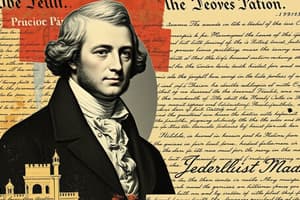Podcast
Questions and Answers
What were the Federalist Papers?
What were the Federalist Papers?
Essays published in New York newspapers over the course of 2 years (1787-1788)
Who wrote the Federalist Papers?
Who wrote the Federalist Papers?
James Madison, John Jay and Alexander Hamilton
What were the Federalist Papers promoting?
What were the Federalist Papers promoting?
The ratification of the Constitution
What did the Federalist Papers argue?
What did the Federalist Papers argue?
What were critics worried about regarding the Federalist Papers?
What were critics worried about regarding the Federalist Papers?
Who authored Federalist 10?
Who authored Federalist 10?
What is the key to controlling government according to Federalist 51?
What is the key to controlling government according to Federalist 51?
What did Hamilton call for in Federalist 70?
What did Hamilton call for in Federalist 70?
What does Hamilton state in Federalist 78 about the Judicial Branch?
What does Hamilton state in Federalist 78 about the Judicial Branch?
What was the purpose of Brutus 1?
What was the purpose of Brutus 1?
What is a unitary government?
What is a unitary government?
What is a confederal government?
What is a confederal government?
What is a federal government?
What is a federal government?
What is participatory democracy?
What is participatory democracy?
What is pluralism?
What is pluralism?
What is elite democracy?
What is elite democracy?
Flashcards are hidden until you start studying
Study Notes
Federalist Papers Overview
- Essays published in New York newspapers from 1787 to 1788.
- Authored by James Madison, John Jay, and Alexander Hamilton.
- Aimed to promote the ratification of the U.S. Constitution.
Arguments for Ratification
- Advocated for a stronger central government to better protect individual liberties.
- Asserted that a national government could safeguard against the tyranny of factions.
Federalist 10
- Written by James Madison.
- Discussed the natural occurrence of factions in a free society and how to control them.
- Proposed two methods: removing the cause or limiting the effect of factions.
- Emphasized that larger republics with multiple factions would dilute the power of any single faction.
- Argued that elected representatives from diverse constituencies would likely be more competent.
Federalist 51
- Also authored by James Madison.
- Focused on the importance of separation of powers and checks and balances within government.
- Suggested that the legislative branch (House and Senate) should hold the most power as it directly represents the people.
- Mentioned federalism as a mechanism for states to check federal authority.
Federalist 70
- Written by Alexander Hamilton.
- Advocated for a strong and decisive single executive as outlined in the Constitution.
Federalist 78
- Another piece by Alexander Hamilton.
- Stressed the necessity of an independent Judicial Branch to ensure fairness and objectivity.
Anti-Federalist Perspective: Brutus 1
- Argued against ratification of the Constitution.
- Warned that a powerful federal government could threaten individual liberty.
Types of Government
- Unitary Government: Centralized system where all powers are held by a single central authority.
- Confederal Government: League of independent states with limited central authority; states retain most powers.
- Federal Government: Powers divided between a central government and local governments, combining elements of both unitary and confederal systems.
Democratic Theories
- Participatory Democracy: Involves collective decision-making by all community members.
- Pluralism: Emphasizes competition among diverse interests, leading to compromise and moderation in governance.
- Elite Democracy: Limits citizen involvement primarily to selecting from competing leaders, focusing on the role of a political elite.
Studying That Suits You
Use AI to generate personalized quizzes and flashcards to suit your learning preferences.




